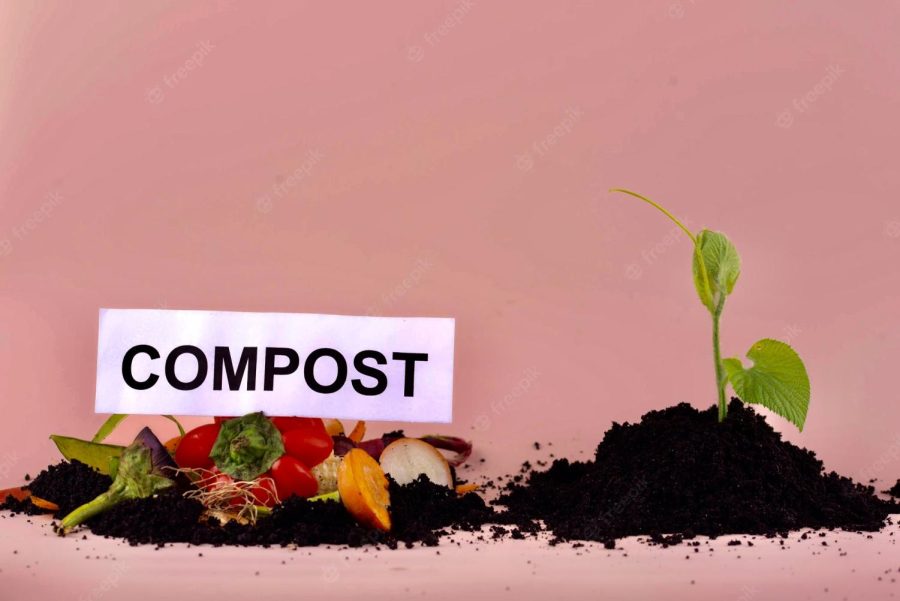The Importance of Composting
December 9, 2022
There are a variety of lifestyle changes that can be made in order to help combat climate change and protect the Earth from further degradation. With its numerous environmental benefits, composting is one method of environmental protection that has the power to make a grand impact on the world.
With time, anything that grows will decompose. Composting is a method of recycling organic matter that speeds up the process of decomposition. A compost can range from a small pile in the backyard to a bin under the sink to an industrial-scale operation. It is simply a mixture of nitrogen-rich and carbon-rich organic materials, such as leaves, food scraps, or other plant material.
Composting occurs when microorganisms eat this organic waste and break it down. Oxygen is necessary for this process to occur. Compost piles should be turned regularly in order to provide the pile with proper airflow. Higher temperatures and moisture will also ensure a faster and more successful decomposition of the materials within the compost.
Often referred to as “Black Gold” by farmers, a compost can be further used in many different ways. The composted material can be used to improve soil structure in plant beds. Additionally, it is rich in macronutrients, bacteria, and fungi, so it can replace chemical fertilizers in potting mixes.
There are various misconceptions when it comes to composting. “The smell is the biggest one,” Mr. Matthew McQueen, John Adams Science Department Chair, said, ”That it’s inefficient, that it takes a long time to see the finished product.”
Many times individuals are discouraged by the fact they don’t see the new soil being produced right away. “They want that immediate satisfaction. That’s not gonna happen when things break down. It takes time!” McQueen said.
And as for the smell… “Getting over that squeamishness isn’t hard,” McQueen said. The benefits of this eco-friendly practice outweigh the misconceptions and the discomfort that composting may evoke. It’s important to focus on the big picture and the numerous advantages of this practice, rather than getting caught up in the discomfort of it.
Composting can be beneficial towards each part of the environment. From the soil we tread to the air we breathe, composting aids many positive environmental processes. It also helps prevent and control looming environmental issues.
“Soil degradation— or, issues with soil,” McQueen said, is one of the environmental issues that compositing tackles. “The more that we compost and use those nutrients and put them back into the soil ourselves, [the more] that it’s going to help solve those soil degradation problems on a local scale.”
Gowri Sundaram, member of the US Compost Council, said that “Capturing carbon and carbon sequestration,” is one of the greatest environmental benefits of composting. Instead of releasing carbon dioxide into the Earth’s atmosphere, composting captures it in the ground.
Composting decreases the amount of methane emissions in landfills. Discarding organic matter into landfills causes it to be broken down without a proper supply of oxygen, releasing two greenhouse gasses — methane and carbon dioxide. If all low-income and middle-income countries would increase their percentage of composted organic matter, 1.13-1.40 gigatons of carbon dioxide could be prevented from being released in landfills by 2050.
However, composting is not an extremely widespread practice. Composting services in the United States are limited, and just 27 percent of people have access to some form of composting service.
The first and most important step in increasing the presence of composts in communities is spreading awareness. “The more that it’s talked about, the more that it’s made obvious, the more awareness that we have, the more it’s going to happen,” McQueen said. “[Composting] is something that we need to promote in order to make improvements for the future.”
Sundaram agreed that greater outreach could increase the practice within communities. Making composting information available to more people can help the method grow in popularity. “Public-private partnerships,” Sundaram said, is another way to increase the amount of composting that occurs in communities.
Introducing composting in schools could also help normalize this practice and encourage more individuals to become engaged. “[Starting] in school cafeterias,” Sundaram said, “[Making] it mandatory for Environmental Club or [making it] a part of [the] school’s curriculum.” These powerful steps could increase awareness of eco-friendly practices such as composting.
“If we had more of an industrialized composting system, we could do something on a larger scale, rather than just a small local scale. I would love to see that happen,” McQueen added .
Composting may seem like an impractical concept for those who live in urban areas. The lack of a backyard or outdoor space may cause individuals to shy away from the practice. However, composting is for everyone, no matter where one might live.
“Just a little box under your sink would work. Even thinking about apartment complexes, there’s ways that [residents] could all chip in together and compost massive amounts and beautify the areas around the apartment complex. Or on their balconies,” McQueen said. As a community, individuals have the power to come together and increase composting efforts, for the sake of the planet.
Composting is an environmentally beneficial practice that creates a relationship between individuals and the Earth. “Having people in contact with the Earth increases their consciousness about how they treat the Earth,”. McQueen said, “The more people that we can get to care about the Earth, the more that we’re going to do to improve it. Compost[ing] is just one small piece of it. The more that we invest ourselves in it, the better it’s going to be for us in the long term.”
Caring about the whereabouts of organic waste can increase overall environmental efforts and eco-friendly practices. It also has the power to prevent large-scale environmental problems, such as soil degradation and global warming. Reversing climate change starts with composting.













